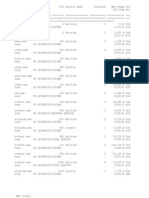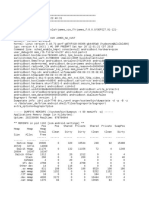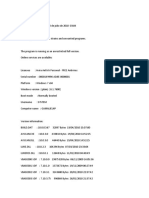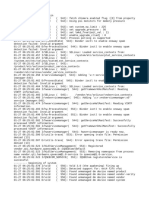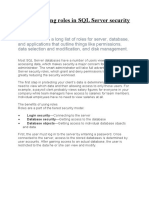0 ratings0% found this document useful (0 votes)
29 viewsTasklist New
Tasklist New
Uploaded by
CsabiThe document lists processes running on a system along with their Process ID (PID), session name, session number, and memory usage. It shows that the system has many svchost.exe processes running that are used to host Windows services and applications. It also lists other common processes like dwm.exe, csrss.exe, and winlogon.exe that handle desktop functions, Windows subsystems, and logon services. Larger processes include elastic-agent.exe, java.exe, and server.exe.
Copyright:
© All Rights Reserved
Available Formats
Download as TXT, PDF, TXT or read online from Scribd
Tasklist New
Tasklist New
Uploaded by
Csabi0 ratings0% found this document useful (0 votes)
29 views7 pagesThe document lists processes running on a system along with their Process ID (PID), session name, session number, and memory usage. It shows that the system has many svchost.exe processes running that are used to host Windows services and applications. It also lists other common processes like dwm.exe, csrss.exe, and winlogon.exe that handle desktop functions, Windows subsystems, and logon services. Larger processes include elastic-agent.exe, java.exe, and server.exe.
Copyright
© © All Rights Reserved
Available Formats
TXT, PDF, TXT or read online from Scribd
Share this document
Did you find this document useful?
Is this content inappropriate?
The document lists processes running on a system along with their Process ID (PID), session name, session number, and memory usage. It shows that the system has many svchost.exe processes running that are used to host Windows services and applications. It also lists other common processes like dwm.exe, csrss.exe, and winlogon.exe that handle desktop functions, Windows subsystems, and logon services. Larger processes include elastic-agent.exe, java.exe, and server.exe.
Copyright:
© All Rights Reserved
Available Formats
Download as TXT, PDF, TXT or read online from Scribd
Download as txt, pdf, or txt
0 ratings0% found this document useful (0 votes)
29 views7 pagesTasklist New
Tasklist New
Uploaded by
CsabiThe document lists processes running on a system along with their Process ID (PID), session name, session number, and memory usage. It shows that the system has many svchost.exe processes running that are used to host Windows services and applications. It also lists other common processes like dwm.exe, csrss.exe, and winlogon.exe that handle desktop functions, Windows subsystems, and logon services. Larger processes include elastic-agent.exe, java.exe, and server.exe.
Copyright:
© All Rights Reserved
Available Formats
Download as TXT, PDF, TXT or read online from Scribd
Download as txt, pdf, or txt
You are on page 1of 7
Image Name PID Session Name Session# Mem Usage
========================= ======== ================ =========== ============
System Idle Process 0 Services 0 8 K
System 4 Services 0 4.872 K
Secure System 140 Services 0 336.928 K
Registry 188 Services 0 45.824 K
smss.exe 752 Services 0 1.160 K
csrss.exe 1092 Services 0 5.368 K
wininit.exe 1180 Services 0 6.376 K
csrss.exe 1188 Console 1 6.376 K
services.exe 1252 Services 0 13.696 K
LsaIso.exe 1272 Services 0 4.508 K
lsass.exe 1288 Services 0 36.052 K
winlogon.exe 1344 Console 1 12.820 K
svchost.exe 1504 Services 0 31.484 K
fontdrvhost.exe 1532 Services 0 6.824 K
fontdrvhost.exe 1540 Console 1 20.684 K
svchost.exe 1636 Services 0 18.248 K
svchost.exe 1684 Services 0 11.008 K
dwm.exe 1744 Console 1 146.556 K
svchost.exe 1932 Services 0 5.104 K
svchost.exe 1940 Services 0 12.068 K
svchost.exe 1948 Services 0 12.000 K
svchost.exe 2020 Services 0 5.108 K
svchost.exe 2028 Services 0 6.176 K
svchost.exe 1192 Services 0 10.048 K
svchost.exe 1172 Services 0 9.164 K
svchost.exe 1392 Services 0 17.336 K
svchost.exe 2064 Services 0 5.608 K
svchost.exe 2100 Services 0 9.788 K
svchost.exe 2112 Services 0 11.892 K
svchost.exe 2192 Services 0 18.184 K
svchost.exe 2284 Services 0 11.908 K
WUDFHost.exe 2580 Services 0 8.968 K
svchost.exe 2708 Services 0 10.836 K
CylanceSvc.exe 2720 Services 0 79.232 K
svchost.exe 2832 Services 0 6.252 K
svchost.exe 2888 Services 0 24.184 K
svchost.exe 2940 Services 0 9.636 K
svchost.exe 2992 Services 0 20.172 K
svchost.exe 2504 Services 0 11.892 K
svchost.exe 2620 Services 0 8.344 K
svchost.exe 2872 Services 0 7.284 K
svchost.exe 3220 Services 0 11.096 K
svchost.exe 3292 Services 0 6.768 K
svchost.exe 3340 Services 0 7.732 K
svchost.exe 3348 Services 0 20.084 K
vmms.exe 3372 Services 0 38.940 K
svchost.exe 3424 Services 0 8.408 K
svchost.exe 3516 Services 0 17.356 K
svchost.exe 3576 Services 0 7.696 K
svchost.exe 3592 Services 0 7.136 K
svchost.exe 3720 Services 0 10.748 K
NVDisplay.Container.exe 3740 Services 0 17.212 K
svchost.exe 3820 Services 0 26.568 K
svchost.exe 3880 Services 0 7.824 K
svchost.exe 3964 Services 0 6.264 K
svchost.exe 4028 Services 0 10.128 K
phions.exe 3256 Services 0 21.072 K
NVDisplay.Container.exe 4384 Console 1 65.764 K
svchost.exe 4488 Services 0 11.596 K
svchost.exe 4496 Services 0 5.580 K
svchost.exe 4504 Services 0 8.964 K
svchost.exe 4568 Services 0 8.772 K
svchost.exe 4576 Services 0 9.340 K
Memory Compression 4620 Services 0 12 K
vmcompute.exe 4720 Services 0 10.280 K
WmiPrvSE.exe 4944 Services 0 25.672 K
svchost.exe 5060 Services 0 14.808 K
svchost.exe 5088 Services 0 6.828 K
RtkAudioService64.exe 5096 Services 0 8.128 K
svchost.exe 4380 Services 0 6.460 K
svchost.exe 4376 Services 0 9.844 K
svchost.exe 5084 Services 0 13.772 K
spoolsv.exe 5308 Services 0 28.848 K
armsvc.exe 5396 Services 0 6.304 K
AppleMobileDeviceService. 5408 Services 0 12.716 K
cellebrite_ufed_iman.exe 5424 Services 0 5.852 K
remoting_host.exe 5436 Services 0 11.048 K
mDNSResponder.exe 5444 Services 0 7.668 K
cellebrite_ufed_openvino. 5476 Services 0 5.848 K
svchost.exe 5492 Services 0 18.708 K
svchost.exe 5504 Services 0 7.920 K
svchost.exe 5520 Services 0 40.868 K
horizon_client_service.ex 5528 Services 0 11.892 K
svchost.exe 5592 Services 0 44.540 K
mounter.exe 5600 Services 0 4.064 K
Emc.Captiva.WebCaptureSer 5688 Services 0 37.744 K
ForensicMobileAnalysisSer 5700 Services 0 41.356 K
CodeMeter.exe 5712 Services 0 29.300 K
FJTWMKSV.exe 5728 Services 0 5.784 K
ftnlsv.exe 5776 Services 0 7.480 K
CmWebAdmin.exe 5784 Services 0 19.872 K
ftscanmgrhv.exe 5808 Services 0 9.412 K
HuaweiHiSuiteService64.ex 5816 Services 0 12.632 K
jhi_service.exe 5892 Services 0 6.300 K
OfficeClickToRun.exe 5920 Services 0 63.652 K
LanWlanSwitchingService.e 5944 Services 0 10.204 K
dasHost.exe 5952 Services 0 13.632 K
elastic-endpoint.exe 5976 Services 0 391.996 K
LMS.exe 6020 Services 0 10.428 K
nvWmi64.exe 6084 Services 0 9.284 K
svchost.exe 6128 Services 0 10.068 K
mqsvc.exe 6136 Services 0 13.724 K
NEService64.exe 5760 Services 0 13.968 K
openvpnserv.exe 5696 Services 0 5.276 K
SonicWallClientProtection 6152 Services 0 11.644 K
SamsungMagicianSVC.exe 6160 Services 0 22.760 K
hasplms.exe 6244 Services 0 24.168 K
svchost.exe 6272 Services 0 5.720 K
TunnelBear.Maintenance.ex 6284 Services 0 33.200 K
Webex.Utils.WatchDog.exe 6300 Services 0 38.164 K
WebEx.Uccm.exe 6352 Services 0 128.864 K
vmware-authd.exe 6368 Services 0 11.896 K
vmware-usbarbitrator64.ex 6380 Services 0 13.064 K
vmnat.exe 6388 Services 0 7.260 K
Sysmon64.exe 6396 Services 0 29.064 K
vmnetdhcp.exe 6432 Services 0 12.132 K
vmwsprrdpwks.exe 6440 Services 0 9.296 K
svchost.exe 6452 Services 0 6.512 K
cmd.exe 6468 Services 0 4.316 K
svchost.exe 6476 Services 0 17.460 K
RAVBg64.exe 6496 Console 1 15.672 K
XtuService.exe 6644 Services 0 145.376 K
conhost.exe 6912 Services 0 11.860 K
svchost.exe 6924 Services 0 8.588 K
cmd.exe 6964 Services 0 4.304 K
elastic-agent.exe 6180 Services 0 41.308 K
dasHost.exe 7336 Services 0 5.264 K
unsecapp.exe 7380 Services 0 7.112 K
conhost.exe 7500 Services 0 11.868 K
remoting_host.exe 7728 Services 0 23.256 K
svchost.exe 8000 Services 0 9.492 K
svchost.exe 7644 Services 0 7.108 K
svchost.exe 8400 Services 0 12.272 K
metricbeat.exe 8584 Services 0 92.548 K
java.exe 8604 Services 0 295.548 K
conhost.exe 8612 Services 0 11.920 K
filebeat.exe 8732 Services 0 57.772 K
server.exe 8820 Services 0 432.316 K
AggregatorHost.exe 8880 Services 0 9.064 K
svchost.exe 9008 Services 0 9.384 K
svchost.exe 8504 Services 0 13.216 K
hasplmv.exe 9604 Services 0 7.000 K
svchost.exe 9776 Services 0 10.540 K
hasplmv.exe 4428 Services 0 7.028 K
svchost.exe 11156 Services 0 12.960 K
svchost.exe 11164 Services 0 19.196 K
svchost.exe 10636 Services 0 18.460 K
filebeat.exe 11736 Services 0 102.864 K
conhost.exe 11872 Services 0 11.900 K
svchost.exe 11472 Services 0 14.292 K
filebeat.exe 11048 Services 0 71.620 K
conhost.exe 11256 Services 0 11.896 K
phion.exe 12312 Console 1 748 K
nvWmi64.exe 12692 Console 1 16.104 K
sihost.exe 12720 Console 1 30.556 K
svchost.exe 12740 Console 1 28.696 K
svchost.exe 12796 Console 1 7.372 K
svchost.exe 12872 Console 1 45.648 K
svchost.exe 12900 Services 0 20.860 K
taskhostw.exe 12960 Console 1 21.868 K
IAStorIcon.exe 13072 Console 1 23.080 K
metricbeat.exe 13212 Services 0 68.328 K
Emc.Captiva.WebToolkitHos 13888 Console 1 36.012 K
svchost.exe 14196 Console 1 22.272 K
svchost.exe 14236 Services 0 17.248 K
svchost.exe 14288 Services 0 12.664 K
conhost.exe 13780 Services 0 11.908 K
SearchIndexer.exe 1268 Services 0 171.800 K
RuntimeBroker.exe 14712 Console 1 27.568 K
Widgets.exe 14748 Console 1 43.992 K
RuntimeBroker.exe 14820 Console 1 61.188 K
svchost.exe 15020 Console 1 18.348 K
dllhost.exe 15496 Console 1 18.716 K
svchost.exe 15660 Services 0 20.028 K
RuntimeBroker.exe 15976 Console 1 21.264 K
svchost.exe 17388 Console 1 21.468 K
PhoneExperienceHost.exe 10324 Console 1 145.432 K
ctfmon.exe 6108 Console 1 21.996 K
RuntimeBroker.exe 17548 Console 1 12.920 K
SecurityHealthSystray.exe 17692 Console 1 9.752 K
SecurityHealthService.exe 17712 Services 0 16.968 K
RAVCpl64.exe 17780 Console 1 16.756 K
NEGui.exe 17968 Console 1 54.996 K
SamsungMagician.exe 18112 Console 1 19.136 K
SamsungMagician.exe 16204 Console 1 8.220 K
Spotify.exe 2140 Console 1 211.636 K
Microsoft.SharePoint.exe 16472 Console 1 38.336 K
SamsungMagician.exe 18756 Console 1 5.640 K
Spotify.exe 19264 Console 1 19.636 K
Spotify.exe 17792 Console 1 78.860 K
Spotify.exe 18768 Console 1 24.964 K
Spotify.exe 19228 Console 1 37.492 K
Teams.exe 18488 Console 1 189.224 K
Spotify.exe 19528 Console 1 143.028 K
Teams.exe 1804 Console 1 126.160 K
Teams.exe 20116 Console 1 46.860 K
Teams.exe 20640 Console 1 64.056 K
Teams.exe 20928 Console 1 62.344 K
Teams.exe 21032 Console 1 332.200 K
Grammarly.Desktop.exe 18632 Console 1 245.184 K
FileSyncHelper.exe 13348 Services 0 19.752 K
Teams.exe 18552 Console 1 142.916 K
slack.exe 20232 Console 1 123.292 K
Teams.exe 10412 Console 1 153.556 K
svchost.exe 21588 Services 0 7.888 K
slack.exe 21692 Console 1 29.744 K
svchost.exe 21744 Services 0 13.224 K
CodeMeterCC.exe 21936 Console 1 34.856 K
slack.exe 21996 Console 1 96.748 K
slack.exe 22016 Console 1 46.240 K
openvpn-gui.exe 22036 Console 1 8.940 K
FtLnSOP.exe 22472 Console 1 8.920 K
slack.exe 22520 Console 1 215.672 K
FjtwMkup.exe 6792 Console 1 9.548 K
CylanceUI.exe 19520 Console 1 8.404 K
FTErGuid.exe 15192 Console 1 13.224 K
FTPWREVT.exe 17468 Console 1 7.296 K
NEIdle.exe 22648 Console 1 6.556 K
svchost.exe 23544 Services 0 11.340 K
svchost.exe 21244 Services 0 16.332 K
auditbeat.exe 20240 Services 0 54.492 K
CCleanerBrowserUpdate.exe 19568 Services 0 1.816 K
CCleanerBrowserCrashHandl 12736 Services 0 1.084 K
CCleanerBrowserCrashHandl 14784 Services 0 1.060 K
GoogleUpdate.exe 19736 Services 0 1.924 K
GoogleCrashHandler.exe 14732 Services 0 1.076 K
GoogleCrashHandler64.exe 21500 Services 0 1.052 K
Microsoft.Management.Serv 19168 Services 0 71.268 K
SecurityUpdateService.exe 19696 Services 0 18.164 K
SgrmBroker.exe 23184 Services 0 13.296 K
msedgewebview2.exe 18520 Console 1 10.828 K
msedgewebview2.exe 13712 Console 1 7.324 K
msedgewebview2.exe 16252 Console 1 5.224 K
msedgewebview2.exe 7904 Console 1 6.964 K
msedgewebview2.exe 7912 Console 1 16 K
msedgewebview2.exe 17432 Console 1 4.356 K
winlogbeat.exe 15092 Services 0 99.516 K
svchost.exe 9864 Services 0 11.744 K
ApplicationFrameHost.exe 8252 Console 1 41.316 K
HxOutlook.exe 5228 Console 1 141.156 K
RuntimeBroker.exe 23284 Console 1 27.132 K
HxTsr.exe 7456 Console 1 59.700 K
SystemSettings.exe 9212 Console 1 2.616 K
svchost.exe 12368 Services 0 10.076 K
slack.exe 4412 Console 1 75.852 K
svchost.exe 21876 Console 1 17.812 K
svchost.exe 13112 Services 0 8.928 K
OUTLOOK.EXE 6428 Console 1 695.900 K
sppsvc.exe 22820 Services 0 18.460 K
msedgewebview2.exe 15952 Console 1 19.900 K
msedgewebview2.exe 1208 Console 1 7.292 K
msedgewebview2.exe 3360 Console 1 5.064 K
msedgewebview2.exe 9872 Console 1 7.284 K
msedgewebview2.exe 16256 Console 1 2.240 K
msedgewebview2.exe 22620 Console 1 2.092 K
msedgewebview2.exe 20312 Console 1 2.084 K
DataExchangeHost.exe 5648 Console 1 27.312 K
Acrobat.exe 16488 Console 1 66.984 K
Acrobat.exe 14056 Console 1 629.128 K
AcroCEF.exe 18792 Console 1 54.732 K
AcroCEF.exe 11888 Console 1 16.916 K
AcroCEF.exe 13556 Console 1 25.048 K
AcroCEF.exe 22892 Console 1 33.800 K
AcroCEF.exe 11024 Console 1 78.228 K
mstsc.exe 15472 Console 1 214.284 K
WINWORD.EXE 2464 Console 1 362.240 K
WINWORD.EXE 5368 Console 1 148.400 K
RuntimeBroker.exe 14136 Console 1 23.780 K
svchost.exe 23712 Services 0 7.784 K
svchost.exe 7592 Services 0 11.856 K
svchost.exe 3404 Console 1 13.712 K
Taskmgr.exe 27096 Console 1 156.676 K
explorer.exe 1380 Console 1 304.240 K
ShellExperienceHost.exe 11620 Console 1 81.176 K
SearchHost.exe 13236 Console 1 282.108 K
StartMenuExperienceHost.e 16012 Console 1 103.780 K
mstsc.exe 13764 Console 1 186.944 K
vhui64.exe 25448 Console 1 50.868 K
xwforensics64.exe 6216 Console 1 226.576 K
Notepad.exe 17648 Console 1 70.912 K
powershell_ise.exe 27016 Console 1 165.940 K
cmd.exe 4280 Console 1 6.032 K
conhost.exe 15924 Console 1 8.112 K
OpenConsole.exe 26168 Console 1 16.676 K
WindowsTerminal.exe 3008 Console 1 82.168 K
RuntimeBroker.exe 25004 Console 1 10.760 K
audiodg.exe 27608 Services 0 22.492 K
svchost.exe 19704 Services 0 9.840 K
AXIOMProcess.exe 25196 Console 1 23.137.584 K
WmiPrvSE.exe 26876 Services 0 25.576 K
Magnet.IPC.Web.Host.Signa 9344 Console 1 60.812 K
SearchFilterHost.exe 14664 Services 0 9.300 K
MagnetAI.exe 27556 Console 1 97.840 K
conhost.exe 13656 Console 1 10.860 K
dllhost.exe 7276 Console 1 9.772 K
CefSharp.BrowserSubproces 27848 Console 1 55.320 K
CefSharp.BrowserSubproces 28148 Console 1 31.908 K
SearchFilterHost.exe 26508 Services 0 11.516 K
AXIOMExamine.exe 27872 Console 1 1.256.648 K
CefSharp.BrowserSubproces 23416 Console 1 35.780 K
CefSharp.BrowserSubproces 26832 Console 1 31.892 K
taskhostw.exe 26844 Console 1 14.692 K
SearchFilterHost.exe 2304 Services 0 9.188 K
AcroCEF.exe 27140 Console 1 76.604 K
AcroCEF.exe 17616 Console 1 75.464 K
AcroCEF.exe 31100 Console 1 80.880 K
CCleaner64.exe 19068 Console 1 68.820 K
chrome.exe 27440 Console 1 203.028 K
chrome.exe 32764 Console 1 8.260 K
chrome.exe 33732 Console 1 155.184 K
chrome.exe 13016 Console 1 49.048 K
chrome.exe 14028 Console 1 18.768 K
chrome.exe 29184 Console 1 305.888 K
msedge.exe 27124 Console 1 366.616 K
msedge.exe 13988 Console 1 8.372 K
msedge.exe 21108 Console 1 99.460 K
msedge.exe 24880 Console 1 55.048 K
msedge.exe 29636 Console 1 20.988 K
msedge.exe 32840 Console 1 175.172 K
msedge.exe 30544 Console 1 127.804 K
msedge.exe 33204 Console 1 24.872 K
msedge.exe 26492 Console 1 94.780 K
msedge.exe 29664 Console 1 179.648 K
msedge.exe 27008 Console 1 122.508 K
msedge.exe 31488 Console 1 64.176 K
msedge.exe 31956 Console 1 61.552 K
msedge.exe 25848 Console 1 64.508 K
msedge.exe 18776 Console 1 63.804 K
msedge.exe 23884 Console 1 95.892 K
msedge.exe 31044 Console 1 94.712 K
msedge.exe 12492 Console 1 118.612 K
msedge.exe 28968 Console 1 88.968 K
msedge.exe 29016 Console 1 109.768 K
msedge.exe 33180 Console 1 112.480 K
msedge.exe 29548 Console 1 31.144 K
msedge.exe 12712 Console 1 20.344 K
chrome.exe 31036 Console 1 21.264 K
AcroCEF.exe 14232 Console 1 66.176 K
POWERPNT.EXE 30584 Console 1 401.908 K
svchost.exe 8964 Services 0 7.084 K
FileCoAuth.exe 11616 Console 1 25.632 K
SearchProtocolHost.exe 25124 Services 0 13.988 K
ai.exe 8844 Console 1 25.516 K
chrome.exe 33612 Console 1 86.716 K
chrome.exe 33448 Console 1 77.380 K
chrome.exe 32792 Console 1 99.548 K
chrome.exe 32132 Console 1 59.304 K
chrome.exe 10348 Console 1 50.268 K
chrome.exe 20912 Console 1 28.820 K
svchost.exe 18536 Services 0 14.164 K
smartscreen.exe 25752 Console 1 10.436 K
MobaXterm.exe 16152 Console 1 69.796 K
XWin_MobaX.exe 21964 Console 1 38.696 K
svchost.exe 9896 Services 0 11.236 K
MobaRTE.exe 33376 Console 1 80.428 K
tasklist.exe 2972 Console 1 9.172 K
You might also like
- Laser Amnc 3i Ref E01 201412Document264 pagesLaser Amnc 3i Ref E01 201412Aldo Efrain Hernandez De La CruzNo ratings yet
- T3tafj5 Tafj Ee Jboss Eap 7x r17Document38 pagesT3tafj5 Tafj Ee Jboss Eap 7x r17Stephen SethuramanNo ratings yet
- MyDomino - EN - ManualsPortal - ScribingLaser - D Series Itech - English - D120i D320i D620i Pharma User Guide English L027971 4Document14 pagesMyDomino - EN - ManualsPortal - ScribingLaser - D Series Itech - English - D120i D320i D620i Pharma User Guide English L027971 4Nikola PerencevicNo ratings yet
- Task ListDocument3 pagesTask ListIan JekoniahNo ratings yet
- Task ListDocument3 pagesTask Listkartheeka.vemuriNo ratings yet
- TestDocument5 pagesTestdanielhordeNo ratings yet
- Task ListDocument3 pagesTask ListDanielNo ratings yet
- TheArtofPublicSpeaking_10002825Document3 pagesTheArtofPublicSpeaking_10002825binhsenpai06No ratings yet
- F 3 D Solver Runner Debug Log FavorDocument9 pagesF 3 D Solver Runner Debug Log FavorSyarifudinBahriKromowijoyoNo ratings yet
- F 3 D Solver Runner Debug Log FullDocument20 pagesF 3 D Solver Runner Debug Log FullSyarifudinBahriKromowijoyoNo ratings yet
- 900193479 Lab Process Management Exercise Win10Document30 pages900193479 Lab Process Management Exercise Win10aaa18123550309No ratings yet
- F 3 D Solver Runner Debug Log PreviewDocument11 pagesF 3 D Solver Runner Debug Log PreviewSyarifudinBahriKromowijoyoNo ratings yet
- Guía de Actividades y Rúbrica de Evaluación - Tarea 1 - El Concepto de IntegralDocument46 pagesGuía de Actividades y Rúbrica de Evaluación - Tarea 1 - El Concepto de IntegralDany Fernando RodriguezNo ratings yet
- 1Document14 pages1dominik lavcelNo ratings yet
- Aips - Exe 1544 Services 0 11.960 KDocument4 pagesAips - Exe 1544 Services 0 11.960 KBaslloneAlovellyNo ratings yet
- GIZ ResursiDocument4 pagesGIZ ResursiAleksandar VidakovicNo ratings yet
- ProcessDocument2 pagesProcessGinna LeytonNo ratings yet
- ProcessDocument4 pagesProcessданиил гончаренкоNo ratings yet
- Proc ListDocument9 pagesProc Listbeserrag94No ratings yet
- Proc ListDocument13 pagesProc ListAndrei VrlanNo ratings yet
- Riot ProcessDocument7 pagesRiot ProcessConorisNo ratings yet
- RedesDocument17 pagesRedescyber arrowNo ratings yet
- Cisco Support Report LogDocument8 pagesCisco Support Report LogsatriaakilNo ratings yet
- Proc ListDocument9 pagesProc ListIvan CastillaNo ratings yet
- Bug Report Green VOltsDocument10 pagesBug Report Green VOltsQamar Hassan IqbalNo ratings yet
- Proc ListDocument9 pagesProc Listvalkirion shadowNo ratings yet
- Prezent AreDocument4 pagesPrezent AreNicoleta TanasescuNo ratings yet
- ProcessDocument8 pagesProcessJose Diaz RiveraNo ratings yet
- Aplicaciones PuertosDocument3 pagesAplicaciones PuertosJoc OrtNo ratings yet
- System Idle ProcesskukuDocument4 pagesSystem Idle ProcesskukuDavid AndradeNo ratings yet
- Support AssistantDocument19 pagesSupport AssistantkamalrudzNo ratings yet
- ProcessDocument10 pagesProcessSamuel AyalaNo ratings yet
- BugreportDocument34 pagesBugreportArshad KhanNo ratings yet
- Bug ReportDocument8 pagesBug ReportHa Nane BmdNo ratings yet
- Console Log ZC026Document7 pagesConsole Log ZC026an.chaykinNo ratings yet
- ProcessDocument5 pagesProcessstealth4269No ratings yet
- Active Connections TCPDocument54 pagesActive Connections TCPUsuariaNo ratings yet
- Advanced TroubleshootingDocument7 pagesAdvanced TroubleshootingSaptarshi BhattacharjeeNo ratings yet
- Process Explorer UtilityDocument13 pagesProcess Explorer UtilityAnas ToufeeqNo ratings yet
- Process Hacker ProcessesDocument4 pagesProcess Hacker ProcessessilcanNo ratings yet
- NO. Nama Barang Harga SatuanDocument2 pagesNO. Nama Barang Harga Satuannahdatilasari NuerNo ratings yet
- Cridex Malware Memory AnalysisDocument14 pagesCridex Malware Memory AnalysisSumit KumarNo ratings yet
- CABLSTMEDocument107 pagesCABLSTMEgnohmNo ratings yet
- LFK00435_PSRPT_2023-02-16_10.29.20Document29 pagesLFK00435_PSRPT_2023-02-16_10.29.20mohamedahmed1972016No ratings yet
- LFK00699_PSRPT_2023-07-11_13.30.08Document26 pagesLFK00699_PSRPT_2023-07-11_13.30.08mohamedahmed1972016No ratings yet
- Deploy From Github To ServerDocument9 pagesDeploy From Github To ServerlauraaaNo ratings yet
- Computer SkillsDocument25 pagesComputer SkillsMulongo LinoNo ratings yet
- ReadmeDocument164 pagesReadmeIsa LindaNo ratings yet
- PCConsole TOCDocument67 pagesPCConsole TOCscribd3991No ratings yet
- Inventarisir Kelengkapan Ex Greend GardenDocument3 pagesInventarisir Kelengkapan Ex Greend Gardenjago parkirNo ratings yet
- MIDASDocument6 pagesMIDASDopan DoganNo ratings yet
- Bullet M2 - NetworkDocument3 pagesBullet M2 - NetworkOscar SanzNo ratings yet
- Bugreport Rjames - VZW - F ODPS27.91 121 10 2019 05 27 22 40 31Document7,284 pagesBugreport Rjames - VZW - F ODPS27.91 121 10 2019 05 27 22 40 31Gabe HollowsNo ratings yet
- Bugreport Cv7a - Lao - Com OPM1.171019.019 2022 04 16 21 54 08Document6,902 pagesBugreport Cv7a - Lao - Com OPM1.171019.019 2022 04 16 21 54 08Nancy SalaisNo ratings yet
- LFK00382_PSRPT_2023-01-31_13.10.22Document29 pagesLFK00382_PSRPT_2023-01-31_13.10.22mohamedahmed1972016No ratings yet
- Bug ReportDocument11 pagesBug ReportCarlos EneasNo ratings yet
- Blender CrashDocument3 pagesBlender CrashomerratasyNo ratings yet
- BugreportDocument27 pagesBugreportequationxsssNo ratings yet
- V 20Document8 pagesV 20BLESSINA PREETHI R 20PHD1246No ratings yet
- Avira AntiVir PersonalDocument7 pagesAvira AntiVir PersonalSamuel BrionesNo ratings yet
- D011 2024-02-19 - PSRPT - 2024-03-30 - 10.28.15Document42 pagesD011 2024-02-19 - PSRPT - 2024-03-30 - 10.28.15MIANo ratings yet
- New Microsoft Word DocumentDocument2 pagesNew Microsoft Word DocumentSerajNo ratings yet
- E-Business Suite Technology Stack Certification RoadmapDocument70 pagesE-Business Suite Technology Stack Certification RoadmapMani Kumar PediredlaNo ratings yet
- License With Server DongleDocument10 pagesLicense With Server DongleEmerson GrossNo ratings yet
- Distributed Systems: Practice ExercisesDocument4 pagesDistributed Systems: Practice Exercisesijigar007No ratings yet
- Cours 05 SignalsDocument115 pagesCours 05 SignalsSai Venkat GudlaNo ratings yet
- Red Hat Jboss Fuse 7.0-Tp: Fuse On Openshift GuideDocument94 pagesRed Hat Jboss Fuse 7.0-Tp: Fuse On Openshift Guidedanidk1986No ratings yet
- Logcat Prev CSC LogDocument77 pagesLogcat Prev CSC LogVictor marleyNo ratings yet
- Cortex M3 LPC1768 ManualDocument68 pagesCortex M3 LPC1768 Manuallaxmipriya bishoiNo ratings yet
- PL/SQL Developer Version Control Plug-In 1.2 User's GuideDocument10 pagesPL/SQL Developer Version Control Plug-In 1.2 User's GuideHaseeb AhmedNo ratings yet
- Revo Blik Internet RACIO Manual Blik - WiFiDocument64 pagesRevo Blik Internet RACIO Manual Blik - WiFiluyckxjNo ratings yet
- C Tadm 22Document4 pagesC Tadm 22Muhammad dhaniNo ratings yet
- Lovish'sDocument37 pagesLovish'sParas TalujaNo ratings yet
- AkashDocument2 pagesAkashAkashAggarwal15No ratings yet
- ECSWI269ver020 Online Proctored Exams Candidate GuidelinesmacOsDocument14 pagesECSWI269ver020 Online Proctored Exams Candidate GuidelinesmacOsmayankverma7No ratings yet
- Hadoop TutorialDocument13 pagesHadoop TutorialbecitratulNo ratings yet
- PRO11Document6 pagesPRO11Kotaro MinamiNo ratings yet
- Bobol WifiDocument2 pagesBobol WifiMuhammad ZaynalNo ratings yet
- Week 9 (Introduction To Microsoft Excel)Document24 pagesWeek 9 (Introduction To Microsoft Excel)College Data ComptrollerNo ratings yet
- UntitledDocument112 pagesUntitledShaikNo ratings yet
- Module 6 Broken Access Control LabDocument3 pagesModule 6 Broken Access Control LabTaha KhanNo ratings yet
- Tutorial: Customizing Markups: ToolbarsDocument2 pagesTutorial: Customizing Markups: ToolbarsMilutinMMNo ratings yet
- Hardening Your AIX SecurityDocument3 pagesHardening Your AIX SecuritySujeet KumarNo ratings yet
- Tom ChenDocument6 pagesTom ChenrajujonnyNo ratings yet
- Administrator's Guide: Windows CE 5.0 - HP Compaq Thin Client t5530Document84 pagesAdministrator's Guide: Windows CE 5.0 - HP Compaq Thin Client t5530Ss SsNo ratings yet
- Vagrant: Virtualbox Provider GuideDocument11 pagesVagrant: Virtualbox Provider GuideManoj KumarNo ratings yet
- SQL Server Security (Logins, Users - Fixed Roles)Document3 pagesSQL Server Security (Logins, Users - Fixed Roles)niaamNo ratings yet
- InformixBestPractices GettingStartedDocument66 pagesInformixBestPractices GettingStartedingedahNo ratings yet
- 30 Powershell Commands You Must Know (Cheat Sheet Included) - TechopediaDocument35 pages30 Powershell Commands You Must Know (Cheat Sheet Included) - TechopediaslutuncleNo ratings yet



































